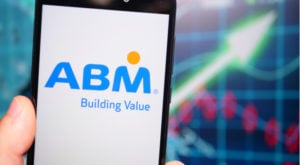Some investments just look after themselves. They are “set it and forget it” kind of stocks. Typically they pay dividends because dividend stocks tend to be profitable businesses that have been through the mill a time or two. They want to share their success with their investors.
The asset managers at Hartford Funds looked at the performance of the benchmark S&P 500 going all the way back to 1930. They found dividends contributed 40% to the total return of the index over that 93-year period. Moreover, dividend stocks never had a losing decade.
Through the combined power of reinvesting dividends and compounding, a $10,000 investment would be worth almost $4.1 million today. A similar investment in the broad-based indexed would have turned into just $641,091.
When searching for dividend stocks to buy and hold, these seven income producers have a long history of rewarding shareholders. They just might deserve a place in the “never sell” portion of your portfolio.
ABM Industries (ABM)
Boring is good when it comes to dividend investing. You get a full dose of that with janitorial supplies leader ABM Industries (NYSE:ABM). It doesn’t often give you big jumps in its stock to go along with its steady income stream though last week it gave investors a bit of both. ABM reported fourth-quarter earnings that beat top and bottom line estimates and guidance was above Wall Street’s expectations too. The stock soared 15% on the news, an uncommon event, though it did subsequently retreat from those highs.
ABM is a leading janitorial services and facilities manager across commercial, technology, industrial, education, and aviation. It’s not an industry given to performance extremes. It was hurt by the pandemic since businesses and offices were closed, but responded by developing ultra-clean services once the economy reopened.
Founded as a window cleaning service in 1909, ABM pays a dividend of $0.76 per share currently yielding 2% annually. It’s paid a dividend every quarter since 1965 and has raised the payout for over 50 years, making it a Dividend King.
The stock trades at 12 times earnings, a fraction of its sales, and goes for a fair 15 times its free cash flow (FCF). It’s a stalwart dividend payer to buy and hold forever.
York Water (YORW)

If you’re looking for dividend consistency, then you can stop right here with York Water (NASDAQ:YORW). This little water utility serving almost 50 municipalities in south-central Pennsylvania has continuously paid a dividend to shareholders every year for 205 years. There is no stock on the market in any industry that’s paid a dividend longer than this water stock.
More so than a janitorial services stock, York’s shares won’t moonshot any time soon. As a regulated utility, its pricing is controlled by the government which tries to balance the need for profitable growth to invest in its infrastructure and its customers’ ability to pay. But it also means you can expect York Water to steadily grow over time. It does so by adding more customers to its rolls. It also consistently pays its shareholders a respectable dividend. York’s dividend yields 2.1% annually.
The remarkable thing is the utility’s performance compared to the S&P 500. Since the turn of the century, York Water has a total return in excess of 1,190% or more than twice the return of the popular index. This is truly a set-and-forget stock.
Clorox (CLX)
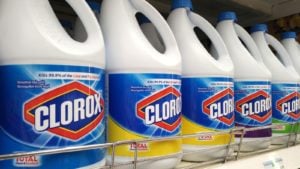
Bleach maker Clorox (NYSE:CLX) is another dividend payer that investors shouldn’t overlook. In addition to its namesake bleach, Clorox owns a portfolio of other brands that regularly rank as No. 1 or No. 2 in their respective categories, including Pine-Sol cleaners, Kingsford charcoal, and Brita water filters. These core brands account for over 80% of Clorox’s $7.4 billion in annual net sales.
After a pandemic-led boom as everyone sought to sanitize any surface they came into contact with, Clorox’s business was hurt by the meteoric rise in inflation. Cash-strapped consumers turned to private label brands to save money which represents Clorox’s primary competition. A cyberattack hit it this year, taking much of its systems offline. It ended up having to process orders by hand hurting sales and profits. It is still assessing the impact on 2024. Its stock lost 30% of its value in the aftermath, though with shares up 24% since then, Clorox is essentially flat year-to-date.
The stock has been a roller coaster these past few years, something not typical for the consumer products giant. A sense of normalcy is returning to the business though and the stock looks expensive based on traditional metrics. It may be a while before it returns to its normal steady-growth state. Clorox is still in good shape financially after implementing a smart cost-cutting plan and targeted price hikes.
It pays a dividend yielding 3.4% annually, and it has made the payout every year since 1970. Clorox is a Dividend Aristocrat that increased its dividend every year since 1978. For income investors, Clorox is a solid choice for a buy-and-hold stock.
Kenvue (KVUE)
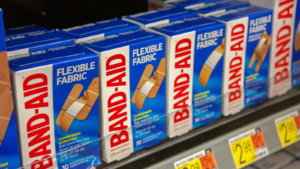
Spun off from healthcare behemoth Johnson & Johnson (NYSE:JNJ) in August, another consumer products company is worthy of your consideration. Kenvue (NYSE:KVUE) doesn’t have the name recognition of Clorox, but its portfolio of brands certainly does. Some of Kenvue’s biggest, best-known brands include Band-Aid, Listerine, Tylenol, and Visine and they, too, are top-rated in their respective categories.
As part of Johnson & Johnson, these products delivered $15 billion in sales last year and almost $3 billion in operating income. Revenue is up 5% so far in 2023 though profits are lower because of high inflation and negative currency exchange rates. Half of Kenvue’s sales come from international markets.
When the consumer health stock was spun off, it adopted by association its parent’s dividend history, meaning Kenvue automatically became a Dividend Aristocrat like Johnson & Johnson. The payout is yielding 3.8% currently. It carries A ratings from various credit rating agencies due to the defensive nature of its largely recession-resistant products. They expect Kenvue to continue the conservative governance policies of its former parent.
Kenvue stumbled out of the gate following its spinoff but has since regained its footing. Shares are up 18% from their low-point though down over 20% from the offer price. That makes it a perfect opportunity for long-term investors to buy in as Kenvue will provide years of generous returns.
Zoetis (ZTS)
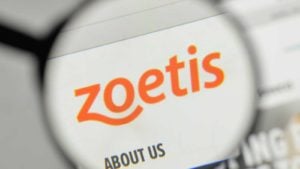
Going from human health to animal health, Zoetis (NYSE:ZTS) is one of the world’s biggest animal health providers that possesses a portfolio of therapies, vaccines, diagnostics, and technologies in use in over 100 countries. It had $8 billion in sales last year and sales are up 5% so far this year.
Vet care is one of the largest segments pet owners spend money on. Almost $137 billion was spent on our furry friends last year, according to the American Pet Products Association. However, some $35.9 billion or 26% was on vet care and products, second only to pet food and treats at $58.1 billion. The industry analysts expect vet care expenses to rise to $37 billion this year.
Although pet owners might move to private-label food products during a recession to save money, they won’t skimp on healthcare for their pets. It’s very much a recession-resistant business and very profitable. Zoetis generates gross margins north of 80% in the U.S. and around 70% internationally. Over the past 10 years the dividends Zoetis paid increased five-fold, from $0.07 per share in 2013 to $0.38 per share today. The dividend yields a modest 1% annually.
NextEra Energy (NEE)
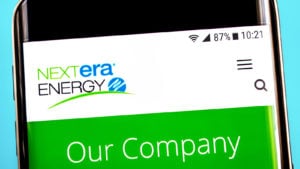
Revisiting utility stocks, NextEra Energy (NYSE:NEE) is an excellent choice for buy-and-hold investors. It serves 6 million customers in Florida allowing it to grow more as people continue migrating to the Sunshine State. The U.S. Census Bureau says Florida is the top destination for residents moving from one state to another. It also has the distinction of being the fastest growing state for the first time since 1957. NextEra owns Florida Power & Light Company, which is America’s largest electric utility that sells more power than any other utility.
That bodes well for the electric utility after the market swore off such investments during the period of runaway inflation. The fixed nature of a utility tends to hurt it more than other sectors when inflation runs rampant. That creates an opportunity for savvy investors who can buy their stocks at discounted prices to their fair value. NextEra is well off its yearly lows but the stock still trades below its averages for nearly the past decade.
The strong cash flows from the utility business allow NextEra to invest heavily in renewable energy. Since 2010, renewables received over $181 billion in investments. Of the nearly 65 gigawatts of energy capacity in its portfolio, 29 gigawatts are from renewable sources. And it keeps adding to it each quarter. It also has a pipeline of 250 gigawatts of renewables and storage in various stages of development. It all makes NextEra Energy a stable, reliable investment for decades to come.
Lam Research (LRCX)
Chipmakers grab the headlines but Lam Research (NASDAQ:LRCX) is selling them the picks and shovels needed to mine their gold. The equipment maker provides semiconductor stocks with wafer fabrication machines and technology that affords them the chance to produce denser chips. Its etch and deposition tools will allow for more sophisticated chips and advanced packaging techniques that artificial intelligence (AI) will require.
For example, an explosive new chip architecture called gate-all-around (GAA) could revive Moore’s Law that says the number of transistors on a chip doubles every two years. That’s starting to hit a wall but GAA would allow manufacturers to have, as its name applies, material on all four sides of a transistor instead of the current three sides. It would vastly improve their speed and efficiency.
Lam Research says its equipment is a $1 billion opportunity per 100,000 wafer starts per month capacity. Customers are flocking to Lam’s etch machines for this purpose. Lam could be the clear-cut winner in this emerging field. It’s still very early innings. The majority of the growth opportunity is still in front of the equipment maker.
Lam Research already uses its free cash flow to generously reward investors. As this new field develops the size of the reward could grow exponentially. The equipment maker says it targets returning 75% to 100% of its FCF to shareholders through share repurchases and dividend payments. Over the past 10 years, Lam’s dividend growth expanded by over 750%. The payout grew from $0.18 per share to $1.73 per share.
With solid growth prospects, a payout ratio of just 27%, and sufficient FCF generation Lam Research can afford decades of additional dividend growth. It’s a forever stock you will want to buy and never sell.
On the date of publication, Rich Duprey held a LONG position in ABM, JNJ, and CLX stock. The opinions expressed in this article are those of the writer, subject to the InvestorPlace.com Publishing Guidelines.

